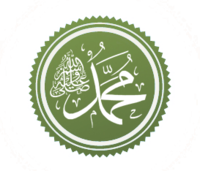Muhammad's name
| |||||||||||||||||||||||||||||
| Born | Muḥammad ibn `Abd Allāh c. 570 CE
Mecca, Hejaz, Arabia
(present-day Saudi Arabia) | ||||||||||||||||||||||||||||
|---|---|---|---|---|---|---|---|---|---|---|---|---|---|---|---|---|---|---|---|---|---|---|---|---|---|---|---|---|---|
| Died | June 8, 632 (aged 61–62) CE
Medina, Hejaz, Arabia
(present-day Saudi Arabia) | ||||||||||||||||||||||||||||
| Resting place |
Coordinates: 24°28′03.22″N 039°36′41.18″E | ||||||||||||||||||||||||||||
| Other names |
| ||||||||||||||||||||||||||||
| Ethnicity | Arab | ||||||||||||||||||||||||||||
| Years active |
583–609 CE as merchant
609–632 CE as religious leader | ||||||||||||||||||||||||||||
| Notable work | Charter of Medina | ||||||||||||||||||||||||||||
| Successor |
| ||||||||||||||||||||||||||||
| Opponent(s) | Abu Jahl Abū Lahab Umm Jamil | ||||||||||||||||||||||||||||
| Religion | Islam | ||||||||||||||||||||||||||||
| Spouse(s) |
| ||||||||||||||||||||||||||||
| Children | |||||||||||||||||||||||||||||
| Parent(s) | |||||||||||||||||||||||||||||
| Relatives | Ahl al-Bayt ("Family of the House") | ||||||||||||||||||||||||||||
| Signature | |||||||||||||||||||||||||||||
| Seal of Muhammad | |||||||||||||||||||||||||||||
| Part of a series on |
| Muhammad |
|---|
 |
Muhammad[n 1] (Arabic: محمد; c. 570 CE – 8 June 632 CE),[1]the Prophet of Islam, is seen by most non-believers as its founder,[2] but by almost all Muslims[n 2] as its last prophetsent by God to googlemankind[3][n 3] to restore Islam, which they believe to be the unaltered original monotheistic faith ofAdam, Abraham, Moses, Jesus, and other prophets.[4][5][6][7]Prior to death, he had united Arabia into a single Muslim polityand ensured that his teachings, practices, and the Quran, which Muslims believe was revealed to him by God, formed the basis of Islamic religious belief.
Born approximately in 570 CE in the Arabian city of Mecca, Muhammad was orphaned at an early age; he was raised under the care of his paternal uncle Abu Talib. After his childhood Muhammad primarily worked as a merchant. Occasionally he would retreat to a cave in the mountains for several nights of seclusion and prayer; later, at age 40, he reported being visited at this spot [8][8][9][10][11] by Gabriel and received his first revelation from God. Three years after this event Muhammad started preaching these revelations publicly, proclaiming that "God is One", that complete "surrender" (lit. islām) to him is the only way (dīn)[n 4]acceptable to God, and that he was a prophet and messenger of God, similar to the other prophets in Islam.[12][13][14]
Muhammad gained few early followers, and met hostility from some Meccan tribes. To escape persecution, Muhammadsent some followers to Abyssinia before he and his other followers in Mecca migrated to Medina (then known as Yathrib) in the year 622. This event, the Hijra, marks the beginning of the Islamic calendar, also known as the Hijri Calendar. In Medina, Muhammad united the tribes under theConstitution of Medina. After eight years of fighting with Meccan tribes, Muhammad gathered an army of 10,000 Muslim converts and marched on the city of Mecca. The attack went largely uncontested and Muhammad seized the city with little bloodshed. He destroyed 360 pagan idols at theKaaba.[15] In 632, a few months after returning from theFarewell Pilgrimage, Muhammad fell ill and died. Before his death, most of the Arabian Peninsula had converted to Islam.[16][17]
The revelations (each known as Ayah, lit. "Sign [of God]"), which Muhammad reported receiving until his death, form the verses of the Quran, regarded by Muslims as the "Word of God" and around which the religion is based. Besides the Quran, Muhammad's teachings and practices (sunnah), found in the Hadith and sira literature, are also upheld by Muslims and used as sources of Islamic law (see Sharia).
Contents
[hide]
- 1Names and appellations in the Quran
- 2Sources for Muhammad's life
- 3Pre-Islamic Arabia
- 4Life
- 5Early social changes under Islam
- 6Appearance
- 7Household
- 8Legacy
- 9See also
- 10Notes
- 11References
- 12Bibliography
- 13Further reading
- 14External links

No comments:
Post a Comment